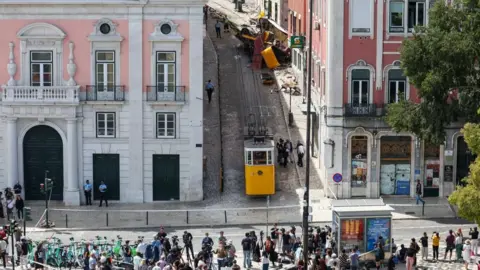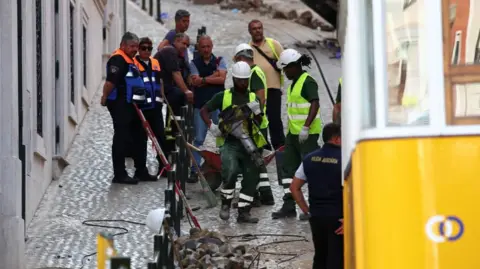Lisbon funicular derailment kills 16, leaves scores injured; three-year-old pulled alive from wreckage
Carriage on historic Glória funicular derailed on a steep bend near Avenida da Liberdade; authorities launch investigations as Portugal observes national mourning
At least 16 people were killed and more than 20 injured after a carriage on Lisbon’s iconic Glória funicular derailed and crashed into a building on Wednesday evening, emergency officials said. Rescuers pulled a three-year-old German boy alive from the wreckage; his father was reported killed and his mother injured.
The carriage is reported to have lost control shortly after 18:15 local time (17:15 GMT) as it negotiated a steep, cobblestoned bend near Avenida da Liberdade, a busy boulevard in the Portuguese capital. Witnesses described the tram-like car overturning and collapsing on its side; one said it "collapsed like a cardboard box." Videos verified by news outlets showed the yellow-and-white vehicle against a building on the bend and another carriage stopped at the base of the hill as people ran toward the scene.

More than 60 rescue personnel and some 22 vehicles were deployed to the scene, authorities said, treating the wounded and transporting the injured to local hospitals. Officials initially reported a higher death toll, which was later revised to 16. Between 21 and 23 people have been reported injured in different health and civil protection briefings, several in critical condition.
Authorities have not publicly released the full identities of those killed, saying families must be notified first. Officials said the dead included Portuguese nationals and foreign tourists. City and national authorities said the victims included five Portuguese citizens and people from South Korea, Canada, the United States, Germany, Ukraine and Switzerland among others; some victims remained unidentified in early reports. The transport workers’ union SITRA said the funicular’s brakeman, André Marques, was among those killed.
Lisbon’s public transport operator, Carris, said it would inspect all of the city’s funiculars and had opened an independent probe. Police and prosecutors have launched their own investigations. Local media reports and preliminary accounts raised the possibility of a cable fault but authorities cautioned that the cause remained under investigation.
Government leaders expressed shock and sorrow. Prime Minister Luís Montenegro offered condolences and said the government was monitoring the emergency response. President Marcelo Rebelo de Sousa pledged full transparency in the forthcoming investigation. Portugal observed a national day of mourning on Thursday after what officials called one of the capital’s worst recent disasters.
The Glória funicular, which connects the downtown Restauradores Square area with the Bairro Alto quarter, has operated since the late 19th century and is both a commuter link and a major tourist attraction. The crash rekindled debate in Lisbon about the effects of heavy tourist use on historic transport systems and infrastructure. Some local residents said the line had seen heavy demand in recent years and questioned whether ongoing wear or maintenance pressures may have played a role.
Eyewitnesses described chaotic scenes in the immediate aftermath. Smoke and dust initially obscured the wreckage, people rushed to help the injured and others stood in shock, according to several accounts. Emergency crews worked to extract passengers and recover bodies from the overturned carriage. Authorities said they were also examining whether any pedestrians or vehicles were struck when the carriage left the track.
Hospitals in Lisbon treated multiple patients for traumatic injuries, and officials said family liaison teams were being set up to assist relatives of victims. Carris and municipal officials said they would cooperate with judicial investigators and provide information from the funicular’s operation logs and maintenance records as part of the probe.
Investigators will seek to determine mechanical and operational causes, including the condition of cables and braking systems and whether staff procedures were followed. The Glória funicular’s age and status as a heritage attraction mean investigators will also consider maintenance records and the potential impact of high seasonal passenger loads.
The Portuguese government and local authorities said updates would be provided as investigations progress and as families were informed. In the days following the crash, Lisbon’s streets showed a mixture of mourning and stunned curiosity as residents and visitors gathered near the scene.

The incident has prompted calls for thorough reviews of ageing urban transport systems in cities that combine routine local use with high tourist demand. Authorities cautioned against premature conclusions and said a full technical and judicial inquiry would be needed to establish the sequence of events that led to the derailment.